|
|
|
Sort Order |
|
|
|
Items / Page
|
|
|
|
|
|
|
| Srl | Item |
| 1 |
ID:
189466
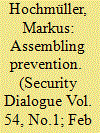

|
|
|
|
|
| Summary/Abstract |
This article examines the technopolitics of prevention in postwar Guatemala. In the 2010s, experts and policymakers shifted security governance in Central America’s most populous country towards anticipation. Against the background of rising gang violence, they implemented a set of sociopolitical and techno-material measures – based on the latest crime-control technologies, new policing strategies and urban design methods – in Guatemala’s most violent municipalities. The stated goals were to reconstruct state sovereignty and to improve public security by strengthening community resilience and inducing positive behavioural change in ‘at-risk’ citizens. Zooming in on the case of Villa Nueva, the article examines the emergence and effects of Guatemala’s ‘prevention assemblage’. It demonstrates that this technopolitical project has failed, as prevention turned into a new layer of control that shifted responsibility to local communities, further securitized urban spaces and populations, and reproduced exclusionary and repressive security governance.
|
|
|
|
|
|
|
|
|
|
|
|
|
|
|
|
| 2 |
ID:
110836
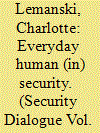

|
|
|
|
|
| Publication |
2012.
|
| Summary/Abstract |
While human security approaches emphasize top-down security concerns and strategies, urban dwellers in the global South experience (in)security in much more immediate and tangible forms, grounded, for example, in citizens' perceptions and fears related to the security of their lifestyles and cultures, as well as their physical, financial and tenure security. Thus, while human security research and policy focuses on security concerns that occur at the global scale, are linked to spectacular events, and result in security strategies that concentrate on collective human needs and state-led responses, citizens' security experiences take place primarily at the local scale, in terms of everyday practices and individual subjectivities, resulting in citizen-led mitigation strategies. The 'gap' between the security agenda's global scale and urban citizens' local scale is the primary focus of this article, which uses empirical examples from the global South to highlight the ways in which urban citizens from diverse socioeconomic groups demonstrate scales of human (in)security that are under-addressed by the conceptual or policy framework. The article concludes with a call to rescale the human security agenda within the context of the Southern city - to consider the local alongside the global.
|
|
|
|
|
|
|
|
|
|
|
|
|
|
|
|
| 3 |
ID:
130213
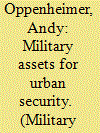

|
|
|
| 4 |
ID:
189464
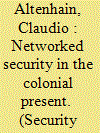

|
|
|
|
|
| Summary/Abstract |
The saturation of urban space with all kinds of information and communication technology–driven security devices has long since turned into a recurrent topic of both human geography and critical security studies. However, comparatively little effort has been made to analyze these technologies and infrastructures in relation to their locally specific modes of deployment. This relative failure to account for technopolitical path-dependencies may result in unilaterally positivistic descriptions, when, in fact, there is no such thing as a technopolitically and/or semantically ‘virgin’ urban fabric waiting to accommodate a new securitarian blueprint. The present article aims to address this lacuna by analyzing the introduction of a ‘smart’ surveillance system in São Paulo, Brazil. Taking as its point of departure the condomínio fechado (the ‘closed condominium’) as a locally specific urban diagram, it sets out to trace the system’s implementation along the lines of a (post)colonial topology sorting bodies and organizing circulations according to a historically entrenched pattern of social domination. Accordingly, despite its failure to significantly reduce crime rates and raise the general level of public security, the system succeeded in further normalizing a configuration in which the obsession with personal security eclipses any potential for political transformation. Its implementation thus endorses a social status quo that is both structurally violent and profoundly unequal.
|
|
|
|
|
|
|
|
|
|
|
|
|
|
|
|
| 5 |
ID:
165018
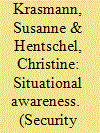

|
|
|
|
|
| Summary/Abstract |
The emergence of ‘situational awareness’ as a response to the perception of a new terrorism in European cities marks a significant shift in the conceptualization of security. Focusing on a recently introduced German Federal Police programme that trains ordinary officers in their capability to handle ‘complex life-threatening situations of police operation’, the article explores how situational awareness introduces a warrior logic into policing and urban subjectivity and modifies our understanding of security at large. It points us to the limitations of preparedness and concretizes the hitherto elusive call to resilience. Three analytical dimensions – space–time, sensing and connectivity – will be developed to render the situation thinkable for empirical research as well as to grasp security as a ‘live’ mode of government.
|
|
|
|
|
|
|
|
|
|
|
|
|
|
|
|
| 6 |
ID:
134171
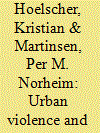

|
|
|
|
|
| Publication |
2014.
|
| Summary/Abstract |
Despite problems of violence domestically, Brazil has played a key leadership role as part of MINUSTAH peacekeeping operations in Haiti since 2004. This article addresses how Brazil's international military engagement is shaping domestic approaches to urban security, and what may be the implications of the use of military strategies, operations, and norms to address issues of public security in Brazilian cities. It is argued that current approaches toward urban security employing military-trained peacekeepers actually represent a continuation of old paradigms, yet these recent militarised approaches are likely evolving into newer and potentially more accountable forms by constraining indiscriminate use of force and establishing a positive state presence in marginal urban areas. As such, the article connects long-established issues of dealing with urban violence in Latin America with ongoing debates in the United States and beyond about post-counterinsurgency approaches to increasingly urban conflict settings. It reflects on potential lessons to be learned from the Latin American perspective, while showing also how these have changed over the last decade. The article concludes that despite the potential utility of force in some urban conflict settings, this approach could entail a normative shift towards legitimising forceful containment of violence, and hinder democratic consolidation in Brazil.
|
|
|
|
|
|
|
|
|
|
|
|
|
|
|
|
|
|
|
|
|